Ever wondered if it’s only your students complaining their goggles fall off? You’re not alone, as Kristy Turner recounts in this humorous take on managing behaviour in the lab
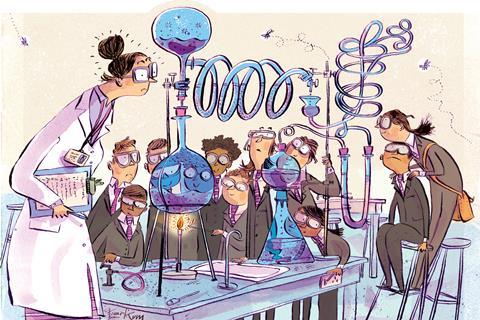
Behaviour, probably the biggest worry for new and experienced teachers alike. It’s the aspect of teaching that trainee teachers fear the most, with endless ‘what ifs’ playing a reel in their heads. And it isn’t trivial for experienced teachers either. A change of timetable, new school, sudden snowstorm or a bit of wind, wasp in the classroom, silent and deadly bottom gas – all have the potential to create a challenging classroom situation!
Classroom and behaviour management are some of the most difficult aspects of teaching. Our students are individuals and have free will; they are teenagers learning their way in the world and they don’t always get it right. This is the same for every teacher no matter what subject they teach, but the chemistry learning environment can be especially challenging.
‘You have taps at home, play with them there and not here’
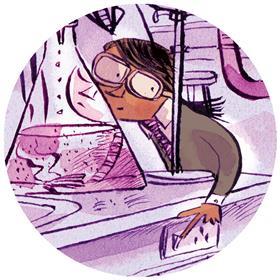
It’s not a competition between subjects, but science labs are more difficult to teach in than most other school spaces. They tend to be bigger so it’s more difficult for everyone to hear each other. So, it is entirely possible that some of the students may not have heard your instructions, not necessarily on purpose, but accidentally. And there are endless things to fiddle with before we even get the equipment out – sockets, gas taps, water taps. I’ve lost count of the number of times I have told students trying to get a single drop of water dangling from a tap: ‘you have taps at home, play with them there and not here’. Those little shelves under the benches are perfect places to practise graffiti skills unseen which, of course, means not properly paying attention.
And then there’s the seating. I have a theory that of all types of seating furniture, stools provide the most open invitation to mischief. In other classrooms, students sit in seats relatively close to the ground. There’s a lot of inertia to overcome, so they mostly stay seated. When sitting on stools, they’re halfway to standing. Even turning round to talk to your mate is easier when you’re sat on a stool and not in a chair, and they’re much quicker to get out of if you fancy a wander around the room.
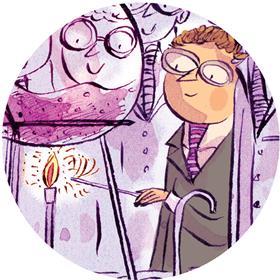
Add a little fuel to the fire
The environment is already challenging so we’d be forgiven for having nice simple lessons with lots of calm textbook exercises. But no, we add in some more potential mayhem, moving around the room for practical work or demonstrations. This is when the characters in class will mysteriously migrate towards each other like there is some kind of magnetic attraction. And in a strange twist on Le Chatelier’s principle, just when you want your students all to stand up, they suddenly feel very tired and decide to sit down. Or, if they do stand up, they leave their stools sticking out and their bags everywhere so that walking around supervising the classroom is like a particularly challenging episode of Gladiators.
Is it me, or are year 7s’ heads suddenly smaller than they used to be?
Not only are students up and out of their seats for practical work, but we then give them glassware to work with, and sometimes acid and fire. We have all met the students who like to keep burning the splint for fun, or who create elaborate plastic sculptures from melted biros. And practical activities can create additional noise – the hum of the fume cupboard, the clinking of glassware and increased chatter – all making classroom management especially difficult.
Safety attire?
Safety goggles or glasses also cause more challenges. The ones with the elastic strap tend to steam up and often students don’t like the marks they make on their faces. The ones that are more like glasses can fall off their noses (is it me, or are year 7s’ heads suddenly smaller than they used to be?). And then you have the students who wear them halfway up their head because they ‘hurt their ears’. Don’t get me started on the state of the box when they pack them away either!
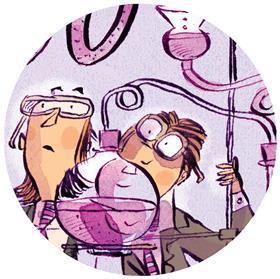
I am sure you are now imagining that my classes are especially chaotic. I promise they’re not. I am simply distilling 17 years of experience teaching in science labs. Most of us get it right most of the time, and our classes make progress. Nothing bad happens and we navigate school life relatively successfully. But there are times when all of us need a little help, and this is where evidence-based approaches are key to us ensuring we set the highest standards.
Thankfully, the Education Endowment Foundation reviewed a wide range of literature to come up with six recommendations, distilled in the Improving behaviour in schools guidance report. Now, practising teachers and teacher trainers have turned those recommendations into six advice-packed articles to help you in your science teaching. So, whether you are a new teacher or a veteran, this series will present you with plenty to help reinvigorate your classroom practice.
More from this series …
In the next article, Niki Kaiser delves into how to know and understand your pupils – and find out what makes them tick. This will help you establish essential classroom routines, set clear boundaries and stick to them unswervingly.
The Education Endowment Fund have reviewed a wide range of literature to come up with their six recommendations in the 2019 Improving Behaviour in Schools guidance report (bit.ly/3mycwaP). Here at EiC, we have asked our practitioner writers to place this in the unique context of teaching in science labs as part of a new seven-part series on this ever-relevant topic. So, whether you are an aspiring or trainee teacher or a veteran, we have plenty to help reinvigorate your classroom practice.
Kristy Turner is a school teacher fellow at the University of Manchester / Bolton School

Behaviour management in the chemistry classroom

Overcome the challenges of misbehaviour in your lab with these targeted tips and strategies
- 1
 Currently
reading
Currently
reading
Double bubble, pupils and trouble
- 3
- 4
- 5
- 6
- 7
- 8













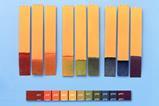
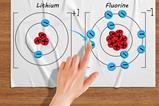













1 Reader's comment